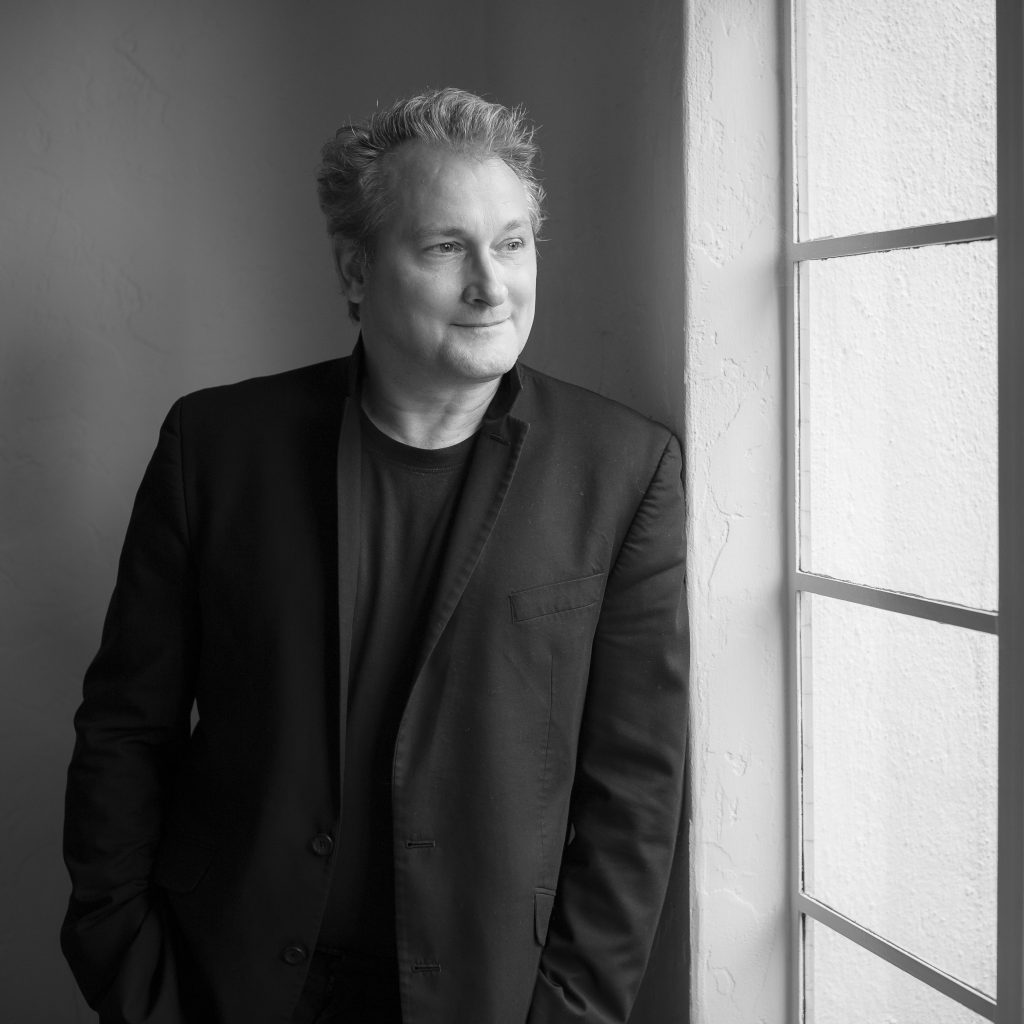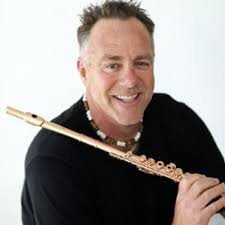Clear-eyed Virtuosity Owns the Night
Christopher O’Riley is arguably one of the most important musicians on today’s music scene. With his classical pedigree–New England Conservatory alumnus, Avery Fisher Career Grant recipient, solo turns with every major North American symphony, his fifteen year run presenting talented and accomplished young musicians as the host of NPR’s From the Top radio show–he has never allowed his love of rock and other popular music to limit either his programming or his world view. By introducing a lovely, gentle sense of iconoclasm, his catholic approach to programming bodes very well indeed for the future of classical music
His recent visit to UC San Diego included a program dedicated to the music of the sophisticated and eclectic rock band Radiohead as well as a mixed chamber music program of Beethoven, Stravinsky, Ravel and Bartók. Curtis Macomber, violin; Peter Seidenberg, cello; and, Allen Blustine, clarinet of the New York Chamber Soloists joined O’Riley in this second (April 22), perfectly curated program.

Christopher O’Riley [photo (c) Dan Williams]
The opening Beethoven Trio in B-flat Major, Op. 11, however, suffered from uncharacteristically rough pianistic passage work. Although this is a minor Beethoven work, the powerful claws of the mighty and maturing lion were on display. The piece was nonetheless articulated beautifully by the sensitive musicians. It was refreshing to hear this particular trio, which is not performed that often, as it showed off Blustine’s amazingly accurate intonation and seamless clarinet phrasing.
The opening jitters of the Beethoven quickly dispensed with, Stravinsky’s Suite from “L’histoire du soldat” (1918-1919) was bracingly played, as refreshing as a dry vodka martini. The well-worn original for seven musicians, three actors and dancers was written during the penurious and uncertain World War I period of the composer’s life of exile in Switzerland. He and his collaborator, Swiss novelist C.F. Ramuz, conceived the work as a small, easily performed theater piece with marginal technical requirements. He subsequently transcribed the version heard here for piano, violin and cello in an effort to encourage more musicians to perform the work. Stravinsky had been cut off from his income and assets due to the Russian Revolution of 1917 and needed all of the income that he could muster.
The clarity and lack of affectation that permeated the entire performance made the music sparkle. All three musicians approached these well-known melodies with loving respect but also with a kind of simple confidence that playing them well, with tight rhythm, perfect ensemble and stellar intonation was all that was necessary to make them soar. Far from making the piece lifeless or boring, they delivered a refreshingly honest and direct interpretation. I often associate this manner of playing with New York free lance musicians, which, at root, is what these guys except O’Riley are. “Just the notes, fellas,” as Officer Joe Friday from Dragnet might have said, had he expressed a love of music . . .
O’Riley took a solo turn with Béla Bartók’s Sonata for Piano (1924.) His muscular, virile performance reminded me of the old Melodiya recording by the late Russian master, Sviatoslav Richter. It was as if O’Riley’s Irish tribe originally hailed from Hungary by the way the pianist infused his interpretation with that characteristic, notoriously dark Hungarian humor. It allowed for a good bit of self-deprecation, while painting a unique sound world on a huge canvas with a panoply of pianistic techniques. It has been said that Bartók approached the piano as a percussion instrument, which holds true for this piece. Except that, here, the piano became a veritable percussion orchestra. Every nuance of timbral possibility was squeezed out of this music in O’Riley’s supernal performance.
A splendid account of Maurice Ravel’s Sonata for Violin and Cello from 1922 followed intermission with Macomber and Seidenberg bringing their mastery to this rarely heard gem. The four movement work proved to be a showcase for the string players’ graceful and precise playing. The piece’s daunting technical challenges were only apparent, if at all, to the cognoscenti since Macomber and Seidenberg utterly dominated this remarkable and relaxed performance that was breathtaking in its simplicity.
“Contrasts for Clarinet, Violin and Piano,” commissioned by Benny Goodman in 1938, concluded the opulent program. Goodman had been introduced to Bartók by the composer’s compatriot and recital partner, violinist Joseph Szigeti. Originally entitled Rhapsody, the work received its partial, two movement premiere on January 9, 1939 at Carnegie Hall with Goodman, Szigeti and pianist Endre Petri. Bartók was dissatisfied with the results and concluded the work by composing its middle movement. The piece was soon recorded with Bartók taking over the piano part.
As with so many of the composer’s works, “Contrasts” utilizes traditional Hungarian folk melodies. Friday’s performance featured seamless ensemble playing and absolutely stunning clarinet work by Blustine–a serious, riveting, and idiomatic approach by all.
Interestingly, O’Riley chose to play all of his ensemble works with the lid completely open. It is a testament to his mastery that he utilized the timbral possibilities available to him with the open lid, yet never drowned out his colleagues with his enormous sound. He also chose an entirely different approach to his sound in “Contrasts,” using a much lusher tone rather than the more percussive one he employed in the Sonata. His approach was as if the two different Bartók pieces on the program were written by entirely different composers. The effect of the preponderantly clear-eyed, objective approach to “Contrasts” allowed for a directness and incisiveness that is rarely experienced. This was, quite simply, an overwhelming performance by three brilliant musicians who knew exactly what they were doing. They delivered the goods.
One can only hope that the interpretive approaches of this concert will be a harbinger of others to follow. There was no celebration of a cult of personality: the concert was expertly played by four serious, dedicated and committed musicians who have spent their lives chasing the unattainable goal of musical perfection. These attitudes, accompanied by an adroitly curated program rendered an outstanding concert.

Yochanan Sebastian Winston, Ph.D. has performed throughout the United States, Europe and Latin America. His repertoire spans classical, jazz, klezmer, new age, contemporary, rock & roll and pop and is very active as a composer. Dr. Winston holds a Ph.D. from the UCSD, a Diplôme from the Conservatoire National de Region de Boulogne-Billancourt (France), and a Master’s and Bachelor’s of Music from the Manhattan School of Music in New York City.
